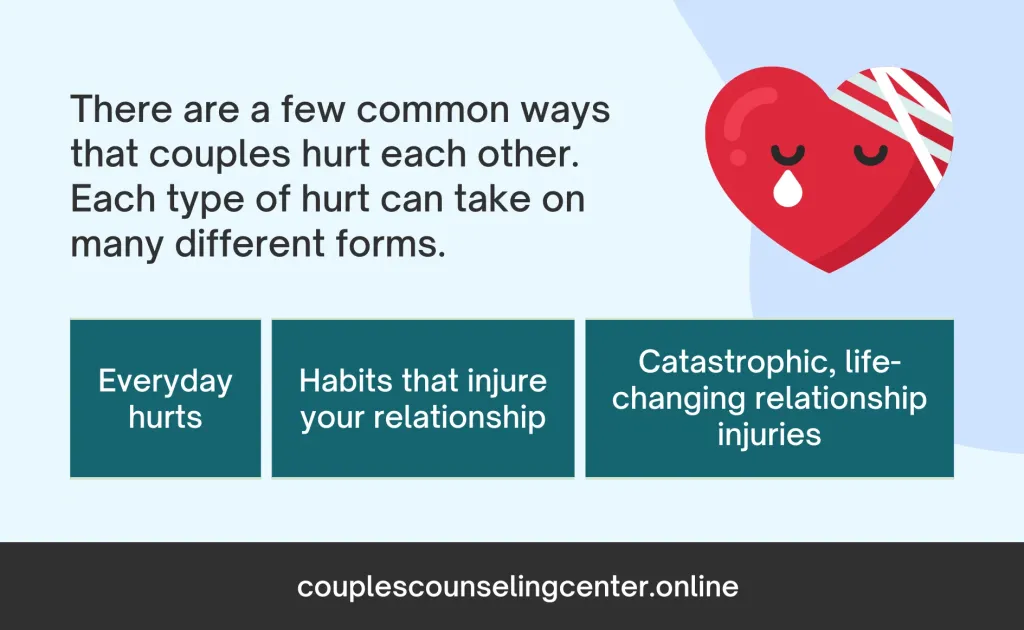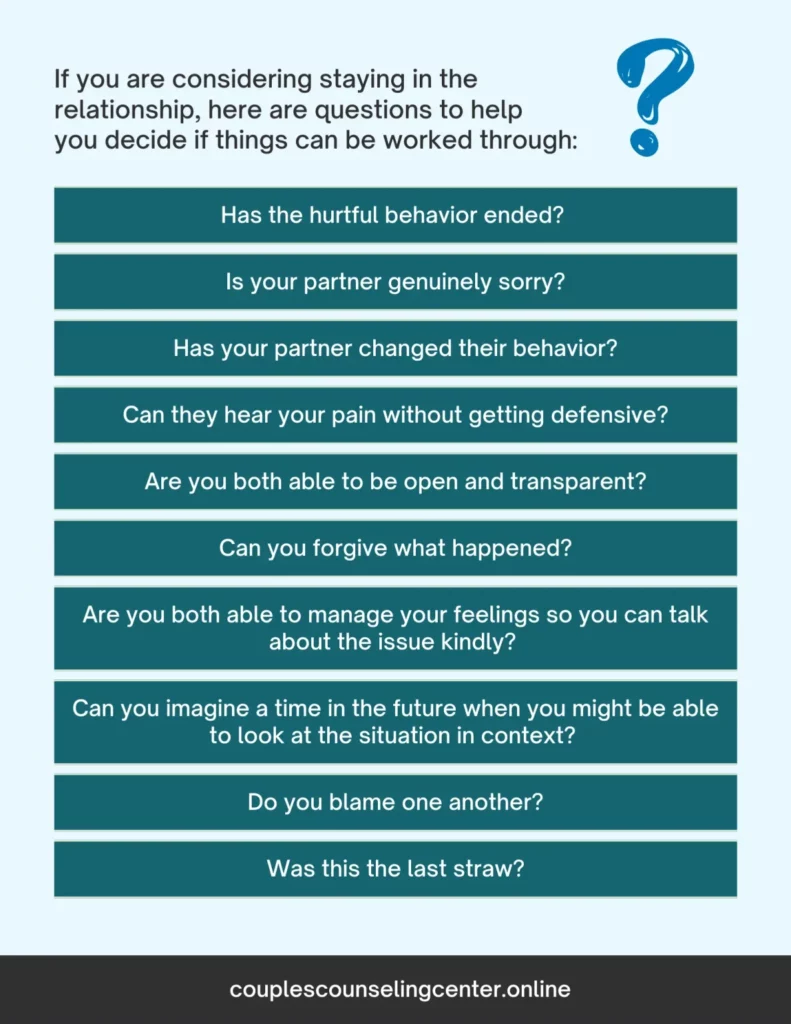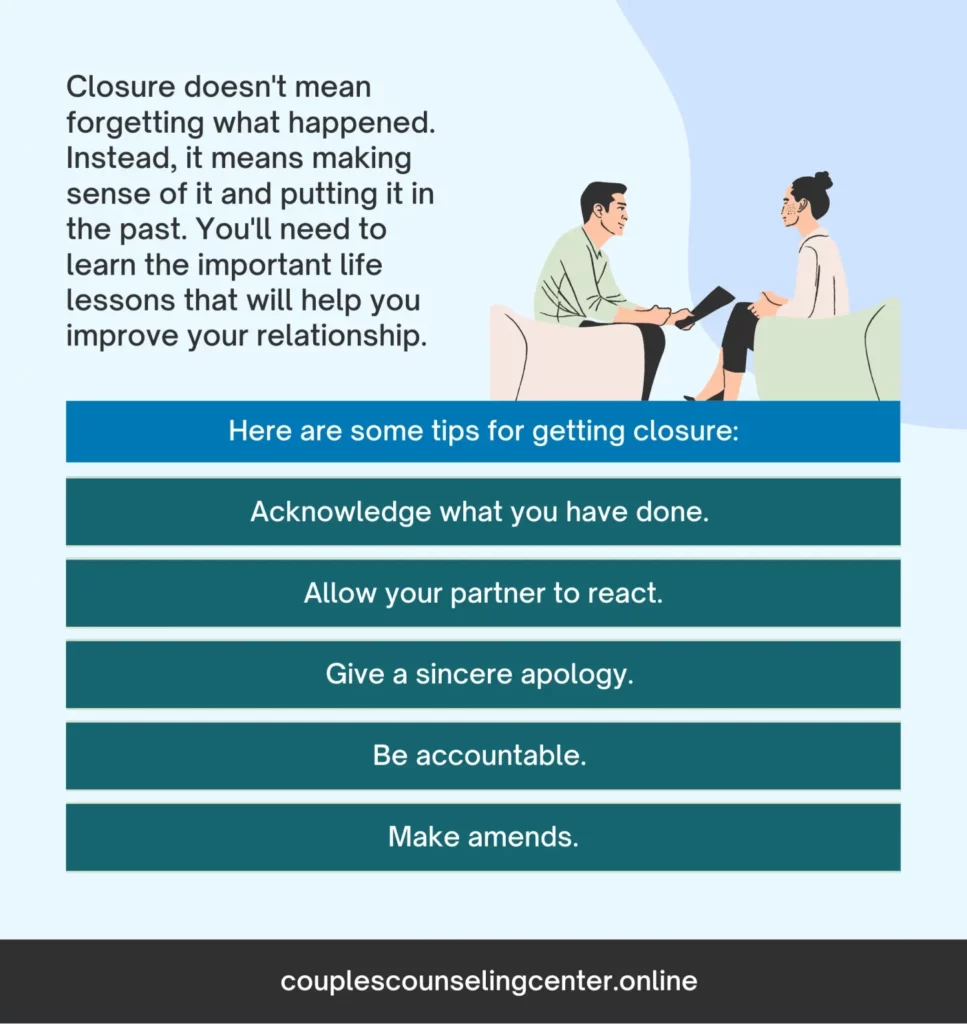Moving Forward in Your Relationship After a Deep Hurt
Something was nagging at the back of your mind. You knew something was off, but you couldn’t quite put your finger on it.
You weren’t even looking for anything. You had to check the phone, bank, or credit card records for something else. You picked up their phone out of curiosity.
Even with a suspicion, what you found was devastating. You found the beginning of a trail that revealed betrayal.

You felt betrayed, hurt, and angry. You didn’t know what to do.
You wanted to confront your partner, but you were afraid of what they would say. Would it be worse if they admitted it or had a plausible explanation?
You were in a state of shock and disbelief. You didn’t know how to process what had happened.
You needed time to think and decide what to do next.
If you are in this situation, you are not alone. Many people have experienced betrayal in their relationships.
When a partner betrays your trust, it is a deeply traumatic experience. The pain and heartbreak feel like a tidal wave crashing and drowning you. It changes how you see your partner, yourself, and your relationship. It may feel impossible to move on from this type of betrayal. Even if your partner is genuinely sorry.
But moving forward is possible. It takes time, effort, and forgiveness, but you will heal from this crisis. You CAN rebuild your relationship.
In this article, we’ll discuss the steps involved in healing and renewing your relationship after a deep hurt. It covers:
- The ways couples hurt one another.
- Surviving the initial crisis.
- The decision to stay or leave.
- Getting closure.
- When you can’t move on.
- Creating a renewed connected, secure, and passionate marriage.
This article walks you through the steps of working through a relationship crisis. You’ll get support and wisdom that cuts through the noise so you can make sense of what happened.
You are not alone. Many couples have survived relationship crises and gone on to have strong, happy marriages. With time, effort, and support, you can too.
Here are some things to keep in mind as you move forward:
- It is normal to feel hurt, angry, and betrayed. Allow yourself to feel these emotions, but don’t let them consume you.
- Talk to someone you trust about what you are going through. Choose someone supportive, but can also be neutral. Good options may be a friend, family member, therapist, or religious leader.
- Give yourself time to heal. It may take months or even years to fully recover from a betrayal, depending on how deep the hurt is.
- Don’t blame yourself for what happened. The betrayal is not your fault.
- Be patient with yourself and your partner. Rebuilding trust and a strong relationship takes time and effort.
You can heal from this betrayal and build a stronger relationship than ever before.
Ways Couples Hurt One Another
You can heal from It’s surprising that those who love us most are also those who will hurt us the deepest. The fantasy is that if someone loves you deeply, they will never hurt you. Unfortunately, being vulnerable with another person carries the risk that they could hurt you.
There are many different ways that couples hurt each other. Some of these hurts are intentional, while others are accidental. No matter how big or small, all hurts can damage a relationship.

1. Everyday hurts: These are the small, thoughtless things that we all do that can hurt our partners. Some are understandable. Others hit a sensitive spot deep inside you that makes it feel like a big deal. We all accept that some of these kinds of hurts are an unavoidable part of living together. Examples:
- Forgetting to do something.
- Getting irritated over an unimportant detail.
- Taking stress out on you that came from another part of their life.
- Being critical instead of asking for a change.
- Letting an argument get too heated.
- Ignoring you because of other distractions.
- Not giving attention when you need it.
- Not including you in decisions.
2. Habits that injure your relationship: It’s easy to forgive a hurtful event that happens once. But when it becomes a persistent habit, it can be harder to live with. Is leaving socks on the floor just a personality quirk, or is it a character flaw? Only you can decide when a small annoyance becomes a chronic problem that threatens your relationship.
Bad habits can be the hardest to change. They can wear down an otherwise good relationship. They can also become the focus of day-to-day irritability and bickering. Examples:
- Criticism makes you feel like you’re never good enough.
- Neglect feel like you’re not important to you.
- Lying erodes trust and makes it difficult to feel close.
- Controlling behavior makes you feel trapped.
- Passive-aggressive behavior, such as sulking or giving the silent treatment, makes you wonder what you did wrong.
3. Catastrophic, life-changing relationship injuries: These are the big betrayals that can shatter a relationship. When they happen, you question every memory, agreement, and value. They are the hardest to recover from. Examples:
- Emotional and Sexual Affairs.
- Financial infidelity.
- Hidden alcohol or substance abuse.
- Missing important events.
- Repeatedly not standing up for you.
- Sharing personal, private information about you with others.
- Deeply hurtful accusations or criticisms.
- An uploaded video that violates your privacy.
- Lying by telling a falsehood or leaving out vital information.
Whether a relationship injury catches you off guard or you see it coming, it makes the relationship feel unsafe. The deep connection and safety that you felt in the relationship crumble away. A relationship hurt feels destabilizing in a way that few other life events can compare to.
No matter how a relationship is hurt, it’s important to remember that it’s possible to heal. It takes time, effort, and communication, but it is possible to repair even the most damaged relationships.
First, you’ll need to survive the initial crisis.

Surviving the Initial Crisis
The day you found out about your partner’s betrayal was a day that will mark your life forever. It was the day that time stood still.
You felt like you were sucker punched. The earth tilted on its axis. You couldn’t breathe. You wanted to curl up in a ball and cry.
The shock of what you had just learned derailed any thoughts you had before. You panicked.
You started questioning everything you thought you knew about your partner and your relationship. Did they ever really love you? Did you ever really know them?
You tried to make sense of what had happened, but there were no easy answers. You sifted through your memories, looking for clues that might explain why your partner betrayed you. But there were no answers to be found.
Amidst this crisis, you need to manage your life. Before you can even think about what happens next in the relationship, you need to find firm footing.
Whether this crisis happened this morning or six months ago, you need to take good care of yourself to survive what’s happened.
Here are some self-care tips to get you started:
- Take care of yourself. Get enough sleep, eat healthy foods, and exercise regularly. Spend time with people who support you and make you feel good.
- Talk to someone you trust. This could be a friend, family member, therapist, or religious leader. Talking about what you are going through can help you to process your emotions and start to heal.
- Give yourself time. It takes time to heal from a betrayal. Don’t expect to feel better overnight. Be patient with yourself and allow yourself to grieve.
You are not alone. You will get through this.
Don’t give up on yourself or your relationship until you have a chance to catch your breath and get your bearings. With time and effort, you will heal. Then you can decide whether you want to stay or leave. (If you want more support, check out the free minicourse–Your Partner Had an Affair: Now What?)
The Decision to Stay or Leave
The initial shock of betrayal is overwhelming. You’ll need time to process what happened and to grieve the loss of the relationship you thought you had. Once the shock starts to wear off, you’ll be able to start thinking clearly about whether you want to stay in the relationship or leave.
This is not a decision that you should make lightly or quickly. There are many factors to consider, such as:
- The severity of the betrayal.
- Your partner’s willingness to make amends.
- Your own needs and wants.
- The impact on your children, family, and friends.
There is no right or wrong answer to whether to stay or leave a relationship after betrayal. The most important thing is to decide with a clear head so you can think through all of the repercussions.

- Has the hurtful behavior ended? If not, any repair work is built on a foundation of sand. The next crisis will wash away the tentative trust and you will start again. It is hard enough to trust again. It becomes almost impossible when the same behavior continues. Just when they start to build the trust, new injuries destroy it.
- Is your partner genuinely sorry? A healing apology needs to reflect genuine regret. A good apology: 1) takes responsibility for any hurtful actions, 2) acknowledges the partner’s pain, and 3) makes specific promises that it will never happen again. You will need to repeat the apology as new aspects of the situation are processed and healed.
- Has your partner changed their behavior? Your partner needs to make changes to their behavior to show that they’re serious about rebuilding the relationship. They need to show that they will protect you against future hurt.
- Can they hear your pain without getting defensive? One of the ways to speed the healing process is for your partner to wholeheartedly listen to your pain. It is uncomfortable to sit with raw emotions. But, it helps you feel heard, acknowledged, and validated. If one partner blames the other, it is a red flag that recovery will be slow.
- Are you both able to be open and transparent? Rebuilding trust requires openness and transparency. Most couples re-evaluate and re-write their agreements around privacy, social media, friendships, and sharing plans.
- Can you forgive what happened? Forgiveness requires you to accept what happened and make the changes to heal the relationship. It doesn’t mean pretending it never happened. It isn’t a one-time event. If you know in your heart that you will always hold this against your partner, forgiveness might not be possible.
- Are you both able to manage your feelings so you can talk about the issue kindly? To heal, you both must be able to feel upset about what happened, but still talk about it productively.
- Can you imagine a time in the future when you might be able to look at the situation in context? A relationship crisis is an invitation and opportunity to make changes in the relationship. When couples see it as a wake-up call, they make the changes they have avoided in the past. A crisis can mark the beginning of a closer, more meaningful relationship. It’s hard to imagine that in the middle of a crisis.
- Do you blame one another? All relationship crises happen in the context of challenges in the relationship. Blame triggers defensiveness, criticism, and shutdown. You need to be able to talk about the issues to fix them. If you focus on blaming one another, it will slow down your recovery.
- Was this the last straw? If your relationship has been filled with many hurtful crises, this latest betrayal might be the final straw. Only you can decide if it’s time to end the relationship.
This is not a comprehensive list, but it does hit many of the indicators of whether the relationship can be saved. Add your own questions that will help make it clear what you should do next.
If you decide to stay in the relationship, be prepared to give yourself time. You will need to forgive your partner, rebuild trust, and create a new sense of safety in the relationship.
If you decide to leave, it’s important to do so in a way that is respectful of yourself and your partner. You may need to seek professional help to navigate this difficult time.
Getting Closure
If you choose to stay together after a betrayal, it’s important to seek closure so that you can move on from the crisis and prevent it from happening again in the future.

- Acknowledge what you have done. It’s hard to come clean, but it’s important to be honest about what happened. Don’t make your partner find out from someone else or act like a detective.
- Allow your partner to react. Give them time to feel their emotions, even if they’re angry, upset, or disappointed with you. It’s important to let them process what happened in their own way.
- Give a sincere apology. A good apology focuses on your partner’s pain and your accountability, not on your own feelings. Be specific about what you did wrong and how you’re going to change in the future.
- Be accountable. Take responsibility for your actions and commit to change. This may mean making changes to your behavior, your communication style, or your overall approach to the relationship.
- Make amends. If your partner has been hurt, do something to make it up to them. This could be anything from giving them a gift to taking on extra chores around the house. They probably have some suggestions for you.
One of the most powerful relationship repairs is to never hurt your partner the same way again. Of course, you can only prove that through action, not intention. Most people will find their partner to be gracious, generous, and forgiving. Especially if the hurtful behavior does not form a pattern or if you are able to stop hurting them.
Closure doesn’t happen overnight. It takes time, patience, and effort. But it’s worth it to put in the work so that you can move past the crisis and build a stronger relationship.
When you can’t move on
Perhaps it’s been a while since you found out about your partner’s betrayal, but it still hurts just as much as it did the day you first learned about it. Each time you think you’ve moved forward, something happens that rips the bandaid off. A rage comes over you and you feel just as hurt as when you learned about it.
It’s helpful to understand why this hurts so much.
- The situation changed how you see your partner. Realizing that your partner could and did hurt you this way changes everything. You used to think that you knew your partner inside and out, but now you realize that you didn’t know them at all. You question their character, their values, and their commitment to you. Like most people, you sift through your history to find those hidden warning signs.
- The situation changed how you see yourself. You feel like a fool for not seeing this coming. You doubt your judgment and your ability to protect yourself and your family. You wonder how your life got so far off track.
- You can’t let your guard down. You’re constantly on the lookout for signs that your partner might betray you again. You feel keyed up and on edge all the time. You’re afraid to trust them, and you’re afraid to let yourself be vulnerable.
- There’s no easy answer. Every option you have is painful. If you stay, you have to rebuild trust. If you leave, you have to start over. Either way, you lost the future you thought you could have.
- Everything is a trigger. Even the smallest things can remind you of what happened. You might see a place you used to go together, or you might hear a song that reminds you of the situation. These triggers can bring back all the pain and hurt, and it can be difficult to cope.
- Forgiveness feels like wiping the slate clean. Part of you holds onto the hurt and anger because you are afraid that your partner will forget how much they hurt you. If they do, they might hurt you again. Keeping the pain front and center feels like it’s protecting you.
- You are waiting. You want to make sure that your partner has really changed. You’re afraid of letting go too soon.
Your reaction is normal and natural. There is no timeline for working through a crisis. You get to forgive when you are ready. Forgiveness absolutely does not mean forgetting.
You deserve to be happy. If your partner is not willing to do the work to rebuild trust and repair the damage, then you may need to make the difficult decision to end the relationship.
Creating a renewed connected, secure, and passionate marriage.
Once you’ve repaired the damage from the crisis, it’s time to take a look at your relationship as a whole. What contributed to the crisis? What long-standing problems need to be addressed?
It’s helpful to talk about any outstanding problems in the following areas:
- Communication: Are you able to communicate openly and honestly with each other?
- Problem-solving: Are you able to work together to solve problems in a healthy way?
- Decision-making: Are you able to make decisions together as a team?
- Building a future together: Are you on the same page about your goals for the future?
- Intimacy and affection: Do you feel close and connected?
- Sharing the workload: Are you fairly splitting the responsibilities of your household?
- Feeling safe and connected: Do you feel safe and secure in your relationship?
- Supporting one another: Are you there for each other in all areas of your lives?
- Valuing personal growth alongside relationship growth: Are you both committed to growing as individuals and as a couple?
You can tackle any of these areas by setting intentional goals and tracking your progress. You may need to learn new skills, tools, and strategies to make progress.
Invitation to Work Together
In this article, I’ve attempted to lay out the important steps to moving through a relationship crisis. If you get stuck or need additional support, I’m available to help. When you schedule a free phone consultation, we can talk about what kind of support you need and how you can get it.
If you are ready to find out whether therapy can help you, schedule a free phone consultation today.


